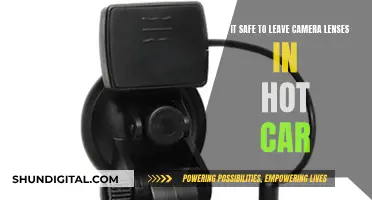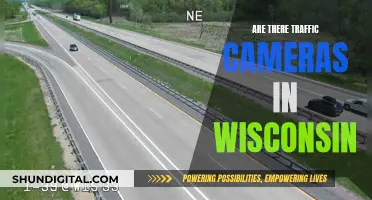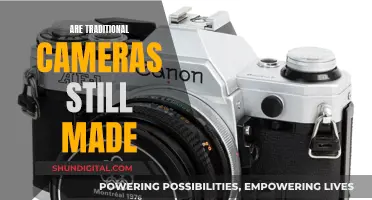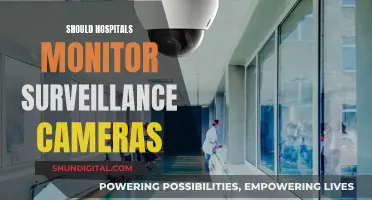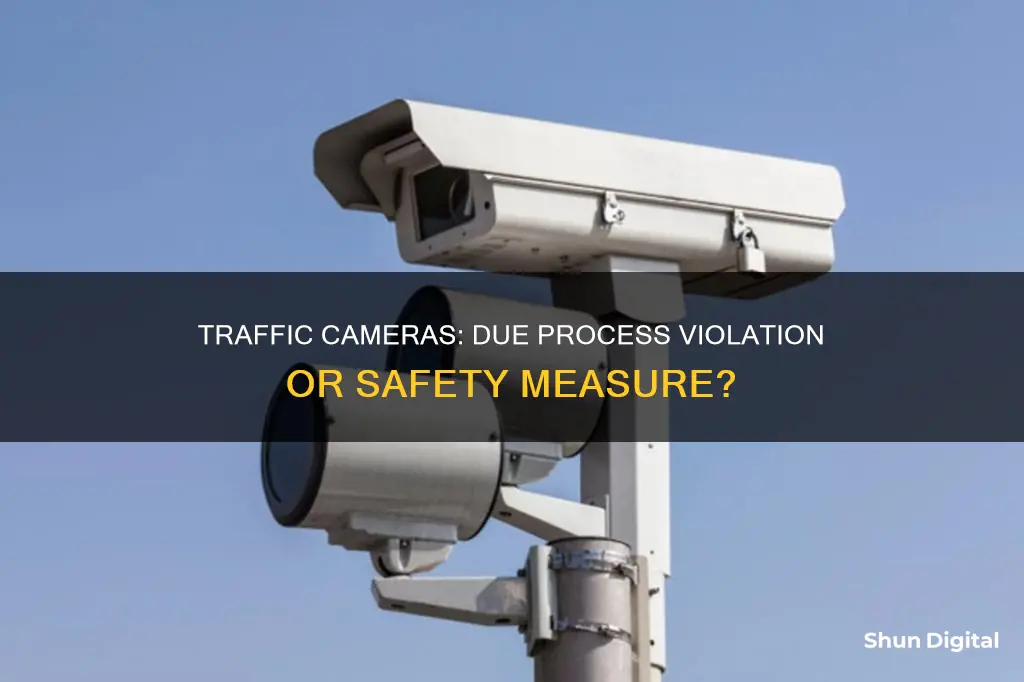
Traffic cameras are an increasingly common feature of roads in the US and worldwide. These cameras are used to monitor and enforce compliance with traffic rules, including speed limits and red lights. While they have been shown to reduce accidents and save lives, their use is highly controversial, with critics arguing that they violate due process and are a form of mass surveillance. This controversy has led to legal challenges and even legislation banning their use in some places. Proponents of traffic cameras argue that they are an effective tool for improving road safety, but opponents raise concerns about privacy, due process, and the potential for governments and private companies to use them for profit. The debate over traffic cameras highlights the complex trade-offs between public safety, individual rights, and the role of technology in society.
| Characteristics | Values |
|---|---|
| Purpose | To detect motoring offenses, including speeding, vehicles going through a red traffic light, vehicles going through a toll booth without paying, unauthorized use of a bus lane, or for recording vehicles inside a congestion charge area. |
| Installation | Mounted beside or over a road or installed in an enforcement vehicle |
| Effectiveness | A worldwide review of studies found that speed cameras led to a reduction of "11% to 44% for fatal and serious injury crashes". |
| Privacy Concerns | The latest automatic number-plate recognition systems can be used for the detection of average speeds and raise concerns over loss of privacy and the potential for governments to establish mass surveillance of vehicle movements and therefore by association also the movement of the vehicle's owner. |
| Due Process Concerns | Ticketed drivers may not be able to fairly defend themselves based on evidence, testimony, and questioning of witnesses. |
| Legality | The use of traffic cameras for enforcement is highly controversial and differs by state. |
What You'll Learn

The right to face your accuser
The use of traffic cameras has sparked debate in recent years, with some arguing that they are a violation of citizens' due process rights. One of the main concerns is the right of the accused to face their accuser, which is a pillar of the legal tradition in Western countries. This idea, known as the Confrontation Clause, is enshrined in the Sixth Amendment of the U.S. Constitution, which states that "In all criminal prosecutions, the accused shall enjoy the right ... to be confronted with the witnesses against him ...".
The issue with traffic cameras is that they cannot be confronted or cross-examined. There is no human witness to testify to the circumstances of the alleged violation or to explain how the camera "evidence" (photos and videos) was collected, analysed, or transmitted. This raises questions about the admissibility of camera-based evidence in court proceedings. In some cases, courts have ruled that camera evidence is insufficient to convict a driver without a technician present to testify about the analysis of the evidence.
Those who challenge the use of traffic cameras argue that they are being accused by a machine, and that the reports generated by these machines are being read by a police officer who has no direct knowledge of the facts. This can create a situation where photographs may be altered or manipulated without the possibility of cross-examination. Additionally, it can be challenging for citizens to defend themselves based solely on the camera-generated evidence, as they cannot question the accuracy or reliability of the camera or the process by which the evidence was obtained.
Proponents of traffic cameras, on the other hand, argue that they improve road safety and save lives by deterring drivers from running red lights or speeding. They also argue that traffic cameras allow law enforcement to focus their resources on more violent crimes. However, critics of traffic cameras point out that they can create a situation where drivers are presumed guilty until proven innocent, which is a violation of due process rights.
The debate over the right to face one's accuser in the context of traffic cameras is ongoing, with varying rulings from different courts. While some courts have upheld the Confrontation Clause as a legitimate defense against camera tickets, others have ruled that camera evidence is sufficient for a conviction even without a technician present to testify. The legal landscape surrounding traffic cameras is constantly shifting, and it remains to be seen how courts will ultimately balance the interests of public safety and due process in this context.
Are School Computers Spying Through Their Cameras?
You may want to see also

Due process and the Fifth Amendment
The Fifth Amendment of the US Constitution states that no person shall be "deprived of life, liberty or property without due process of law". This is further supported by the Fourteenth Amendment, which uses the same wording to describe a legal obligation of all states.
The Fifth Amendment's reference to "due process" is one of many promises of protection that the Bill of Rights gives citizens against the federal government. The Fourteenth Amendment's Due Process Clause has been interpreted to mean that state and federal obligations are the same.
The "due process" clause suggests a concern with procedure rather than substance. However, some believe that the clause does include protections of substantive due process, such as the right to work, marry, and raise children.
In the context of traffic cameras, the issue of due process arises when considering the ability of drivers to challenge tickets issued through automated systems. In Ohio, for example, a county judge ruled that traffic cameras that give tickets violate the constitutional rights of drivers by eliminating the possibility of due process. Drivers are unable to fairly defend themselves based on evidence, testimony, and the questioning of witnesses.
The use of traffic cameras has sparked debate across the country, with some arguing that they save lives by deterring drivers from running red lights or speeding, while others view them as a violation of due process and a means for municipalities to generate revenue.
Surveillance History: 1930s Cameras and Their Evolution
You may want to see also

Public safety and privacy
Traffic cameras are an increasingly common feature of roads in the US and worldwide. They are used to detect a range of motoring offences, from speeding to running red lights, and can be mounted beside or over a road or installed in an enforcement vehicle. While some people argue that they improve road safety, others believe that they violate due process and are a way for local authorities to generate revenue.
Public Safety
Traffic cameras are often introduced with the aim of improving public safety by reducing the number of vehicle accidents. For example, in Columbus, Ohio, side-impact collisions are down by 74% at intersections with red-light cameras. A UK Department for Transport study found that camera sites had 42% fewer people being killed or seriously injured. A worldwide review of studies found that speed cameras led to an 11% to 44% reduction in fatal and serious injury crashes.
However, the evidence is mixed. Some studies show that while cameras reduce right-angle crashes, they may lead to more crashes overall as drivers who slam on the brakes to avoid running lights get into more rear-end collisions. One study found that cameras changed the composition of accidents but did not reduce the total number of accidents or injuries.
Privacy
Traffic cameras, particularly those with automatic number-plate recognition, have been criticised for infringing on privacy and enabling governments to establish mass surveillance of vehicle movements and, by association, the movements of vehicle owners. In the UK, for example, the police ANPR system logs all vehicles passing particular points, allowing the authorities to track the movement of vehicles and individuals. In another instance, a family in New Miami, Ohio, received five $95 speeding tickets in one day as they drove past the same traffic camera multiple times while lost.
Due Process
Due process is a requirement of the Fifth Amendment of the Bill of Rights. In the case of traffic cameras, due process relates to a driver's ability to challenge a ticket and ensure it was issued correctly. When a police officer pulls a driver over for speeding, the driver can take the ticket to court, check that the officer's radar equipment was working properly, and appeal to the judge to dismiss or reduce the penalties. With a ticket from a speed camera, this process is more complicated. Speed cameras are often run by private companies, and cities may try to set up streamlined administrative hearings where citizens have fewer chances to challenge the ticket.
In addition, there may be a conflict of interest when private contractors are paid a commission based on the number of tickets they issue. In one case, pictures from a red-light camera system in San Diego were ruled inadmissible as court evidence because of a "total lack of oversight" and the method of compensation made the evidence "untrustworthy and unreliable".
While traffic cameras are often introduced with the aim of improving public safety, their effectiveness in reducing accidents is disputed. They also raise concerns about privacy and due process, particularly when private companies are involved in their operation and enforcement.
The Evolution of Camera Straps: Materials and More
You may want to see also

Revenue generation and policing for profit
The use of traffic cameras has been a source of contention, with critics arguing that they are a means of revenue generation and policing for profit, while supporters claim they improve road safety.
Revenue Generation
Traffic cameras, particularly speed cameras, have been criticised for their use as a revenue source for local governments and private companies. In some cases, cities have relied heavily on revenue from traffic fines, with one example being the city of Oak Park, which collected $20,000 to $30,000 per month in traffic citation revenue. This practice, known as "policing for profit", has raised concerns about the motivation behind the use of traffic cameras.
Private companies that operate speed cameras also profit from the fines collected. For example, in Stillmore, Georgia, the company RedSpeed retained 33% of the fines, plus additional service fees. This business model has been criticised as a "profit-center" for private companies, with little oversight and a potential conflict of interest.
Policing for Profit
The use of traffic cameras has been associated with the concept of "policing for profit", where law enforcement activities are driven by financial incentives rather than public safety. This practice has been observed in several cities across the United States, where local governments have used traffic fines as a significant source of revenue.
In some cases, cities have installed traffic cameras specifically to increase revenue without raising taxes on residents. This has led to concerns about the prioritisation of profit over public safety and due process. For example, in Elmwood Place, Ohio, the primary motivation for installing speed cameras was to generate income from fines, rather than improve road safety.
The use of traffic cameras has also been linked to issues of privacy and mass surveillance. With the latest technology, governments can potentially track vehicle movements and, by association, the movements of vehicle owners. This has raised concerns about the right to privacy and the potential for abuse of power by governments and law enforcement agencies.
Impact on Public Perception and Trust
The use of traffic cameras for revenue generation and policing for profit has had a negative impact on public perception and trust in law enforcement. Some people view these practices as a form of "Big Brother tactics" and an over-monitoring of public roads. This has led to a backlash against traffic cameras in some communities, with referendums and campaigns to remove or ban the use of these cameras.
In conclusion, while the use of traffic cameras may have some benefits in terms of road safety, there are significant concerns about their use as a tool for revenue generation and policing for profit. The lack of due process, the potential for privacy invasions, and the perception of "policing for profit" have all contributed to a decline in trust and an increase in scrutiny of these practices.
The Lasting Legacy of the Pd16 Plenax Folding Camera
You may want to see also

The role of private contractors
The use of traffic cameras has sparked a debate about their effectiveness in improving road safety and whether they violate due process. These cameras are often operated by private companies, and their involvement has come under scrutiny for several reasons.
Private contractors play a significant role in the operation of traffic cameras, including red-light and speed cameras. In Columbus, Ohio, for example, when a driver runs a red light at an intersection with cameras, a twelve-second video clip and high-resolution photos of the vehicle are sent to a private contractor. The contractor then identifies the vehicle owner and sends this information to the police department for review. The private contractor is also responsible for mailing citations to drivers, who can either pay the fine or request a hearing.
The profit motive of these private companies has been a major point of contention. Critics argue that these companies prioritize profit over public safety. For instance, American Traffic Solutions (ATS), Inc., an Arizona-based company, keeps up to 86% of the profit from its red-light cameras, while the municipalities they supply barely break even. Similarly, Redflex Traffic Systems, based in Phoenix, Arizona, retains up to 88% of the proceeds from traffic violations caught using its equipment. This has led to concerns that the companies are more focused on financial gain than on actually improving road safety.
Another issue is the potential conflict of interest when private contractors are paid based on the number of tickets they issue. This was highlighted in a case in San Diego, where a judge ruled that evidence from red-light camera systems was inadmissible due to the "total lack of oversight" and the "method of compensation". The judge deemed the evidence "untrustworthy and unreliable".
Additionally, the use of private contractors in traffic camera operations has raised questions about fairness and timeliness. Opponents argue that the technology has little effect on overall safety and is merely a revenue-raising tool for localities. There are also concerns about privacy, as the cameras are often unable to clearly identify the driver, and tickets are issued to the registered vehicle owner instead.
Surveillance Camera Abuse: Know Your Rights, File a Labor Complaint
You may want to see also
Frequently asked questions
Traffic cameras are cameras mounted beside or over a road or installed in an enforcement vehicle to detect motoring offenses, including speeding, vehicles going through a red traffic light, vehicles going through a toll booth without paying, unauthorized use of a bus lane, or for recording vehicles inside a congestion charge area.
The use of traffic cameras for enforcing traffic laws is legal in some states and illegal in others. Even in states where they are legal, the specific laws vary. For example, in Ohio, a police officer must be present for traffic cameras to be used.
Advocates of traffic cameras argue that they save lives by reducing accidents and injuries. They also claim that they allow police to focus on more violent crimes.
Opponents of traffic cameras argue that they violate due process, as drivers are not able to fairly defend themselves based on evidence, testimony, and questioning of witnesses. They also argue that traffic cameras are a form of "policing for profit," where municipalities and camera manufacturers benefit financially from the issuance of tickets.


